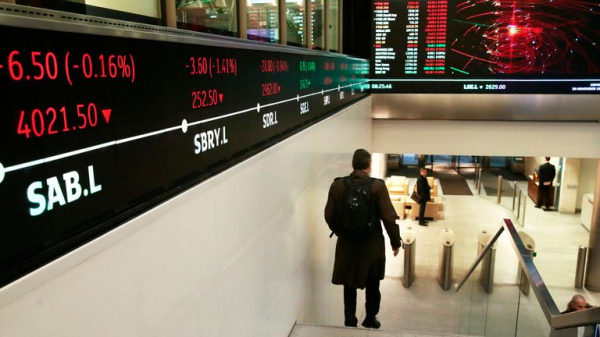Why do so many major companies release results on the same day in July?

What do the following have in common – Centrica, Rentokil, BT, Barclays, Anglo American and St James’s Place?
On the face of it, not very much.
All, though, were updating the market on their recent trading.
Many others were, too, among them Relx, the data and analytics giant; Schoders, the asset manager; Shell, the oil supermajor; Sage, the accounting software group; Frasers Group, Mike Ashley‘s retail conglomerate and RS Group, the components distributor.
In all, some 16 FTSE-100 constituents – almost one in six members of the index – were publishing financial results.
Outside the Footsie, there was also a blizzard of results, with ITV among companies updating the market.
You may not think this matters very much. But it does.
The problem with spreading resources thinly
So many companies publishing their results at the same time makes it very difficult for investors, analysts and the media to properly assess how a business has traded in recent months and form a judgement on how it will do in coming months.
The ranks of City analysts have already been slashed since the introduction of the EU’s MIFID II directive and that has led to a lack of research on a lot of quoted companies, especially in the small and mid-cap sectors.
Accordingly, all these businesses releasing results on the same day simply spreads the resources of those who remain even more thinly.
Company results go under-researched – and, potentially, share price anomalies emerge as a result. That creates opportunities, of course, for those who do have the resources to properly analyse company results. But it also leaves a lot of other investors potentially short-changed.
Why does this happen?
Why has this situation emerged?
There are a few reasons.
The first is the insistence from regulators that companies get their results out in a timely manner.
Most companies these days have a December financial year-end.
That means the first half of their financial year is at the end of June – and, with company finance departments taking a month or so to tot up their results and then submit them to the auditors for their blessing, means a barrage of results hit the screens in the final week of July.
It used to be different
Not so long ago, perhaps a quarter of a century back, a lot of companies were happy to go away and have a summer break and get back to issuing their half year results in September.
Regulators these days, though, insist on a more rapid publication of results lest a false market emerges in some share prices. Hence the end of July rush.
Why Thursdays are popular
There is also a reason why results all tend to land on a Thursday.
Companies, especially the larger ones, prefer not to release their results on a Monday or Tuesday because it often obliges company chief executives and chief financial officers to rehearse presentations to investors during the preceding weekend.
They prefer to do that once the working week is under way – making the tail end of the week a better option.
Fridays tend to be out – a throwback to the days when senior City folk would have left for their country retreats by Friday lunchtime – and so that leaves Wednesday or Thursday. Going on a Thursday gives extra time at the start of the work to rehearse investor presentations and think about the best way in which, for example, a poor set of results can be presented to the market more favourably.
Why July and February are busy
It always means that the last Thursday of July, the first and second Thursdays of February (full year results always take a little longer to prepare due to Christmas holidays) and, to a lesser extent, the final Thursdays of April and October (for those companies who publish quarterly results) always tend to be chocker with results.
Not much can be done
Is there anything that can be done about it? Not really.
It is unlikely that companies are going to move away from December or June financial year ends and the Financial Conduct Authority is not going to water down its rules on the timely reporting of financial results.
A possible US solution
One solution that is sometimes proposed is for UK-listed companies to publish their results after the market has closed, something that is commonplace in the United States.
The problem with that, though, is that the US has a much more established tradition of after-hours trading while the UK does not. In addition, liquidity (the ease with which a security can be bought or sold) is much lower in after hours trading, so price movements tend to be more volatile, something that would put small investors in particular at a disadvantage.
So it seems investors are saddled with the current arrangement.

Today’s results
In the meantime, what can be deduced from today’s results?
It is not always obvious from share price movements, which can often simply reflect the extent to which a company’s results were in line with the market’s expectations going into those results.
Sometimes, though, results can be bang in line with expectations and a share price will sell off, as is the case when a company is regarded as growing strongly, something that happened this week with Compass, the world’s biggest contract catering company, an impeccably run business that investors perceive as having strong growth prospects.
Often, though, it depends on the outlook statement and what company officials say to investors on the day.
Results days are often when companies try to reset market expectations.
Bear that in mind with today’s results.
Centrica has turned out to be the star performer in the Footsie.
A big recovery in profits at British Gas had been factored in but perhaps not as big as the one which was announced. Investors also liked the extension of the company’s share buy-back programme.
Another stand-out was Informa, the world’s biggest exhibitions and events organiser, where again the strong momentum recently flagged by the company had not been sufficiently priced in by the market.
Meanwhile Airtel Africa, one of the more recent additions to the FTSE-100, was also another strong gainer despite reporting a quarterly loss after tax of $151m.
This, though, had already been flagged to the market – it was due to a devaluation of Nigeria’s naira – and investors chose to focus instead on the fact that the company, whose shares had fallen by 18% since mid-June, reported strong sales growth in all parts of its business.
Another stand-out among those companies reporting today is Relx, the data information and analytics specialist, one of a handful of British companies that can be regarded as a genuine world leader in its field. The best performing stock in the FTSE-100 over the last decade, hopes are running high for Relx, with a leading Wall Street bank recently naming it as one of the 10 global companies – alongside Microsoft and Nvidia – most likely to benefit from generative artificial intelligence.
The 9% rise in half year sales it unveiled today were enough to satisfy its followers that their faith was not misplaced.
Spreaker This content is provided by Spreaker, which may be using cookies and other technologies. To show you this content, we need your permission to use cookies. You can use the buttons below to amend your preferences to enable Spreaker cookies or to allow those cookies just once. You can change your settings at any time via the Privacy Options. Unfortunately we have been unable to verify if you have consented to Spreaker cookies. To view this content you can use the button below to allow Spreaker cookies for this session only. Enable Cookies Allow Cookies Once
Listen and subscribe to the Ian King Business Podcast here
To the downside, the wealth manager St James’s Place saw its shares fall by 15% after the wealth manager cut its forecast for the margin it receives from investment management fees, while Shell fell because the $5.1bn adjusted earnings it reported for the three months to the end of June was well short of the $5.6bn the market had expected.
The other big disappointment of the day was Barclays, whose shares fell by 6% at one point, with its half year results containing a plethora of bad news.
Impairments against doubtful loans were up sharply, customer deposits were down, investment banking revenues – a crucial part of the business – compared unfavourably with Wall Street rivals while the net interest margin – the difference between what a bank charges borrowers and pays depositors – is set to fall as the benefits of higher interest rates to the lender drop away.
Today’s clutch of results from the FTSE-100 saw more share price gainers than fallers among those reporting. Did that mean the prospects for such companies are better, for most, on balance?
Not necessarily. The index, after a brief flurry last year, has reverted to its usual habit of underperforming those in Europe and the US. That means many UK-listed companies are again trading at a discount to global peers.
The reason for that, though, is a story for another day.
